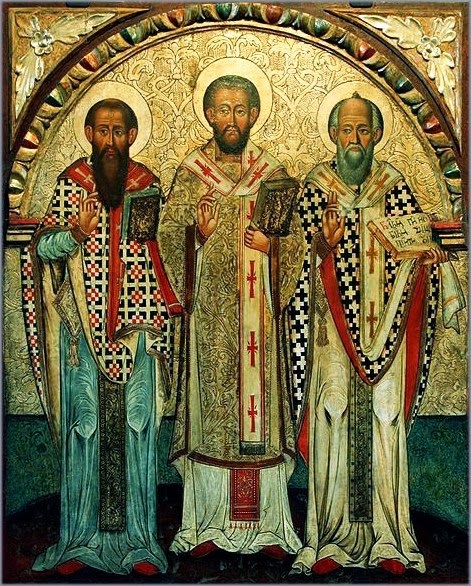|
Listen to this post:
|

I’m excited to announce that my paper with the above title has been published in the excellent open-access journal TheoLogica.
In this paper I present what I think is a strong case that we see the idea of a triune God in both “Western” and “Eastern” sources just before and after what I consider to be the first (implicitly) trinitarian council, the one at Constantinople in 381, in which the emperor declared the “Nicene” side in the long-running “Arian” controversy to be correct. But this, as I show, had evolved to include the idea that the sharers of the divine essence are (or are “in”) the same God, the tripersonal God.
This is in opposition to what I call the “Western misunderstanding narrative” which has been recently championed by Dr. Beau Branson, and by some other Orthodox scholars, including Dr. John Behr. In their view, the East held to “the monarchy of the Father,” in a sense where this implies that the one God just is (numerically the same as) the Father, and only some time in the Middle Ages did this “Western” misunderstanding creep in. They cite Augustine as one of the earliest who thought that the one God is the Trinity, rather than the Father. They’re right about that, but as I show, they are mistaken in thinking that this is a particularly “Western” view.
This is an interesting dispute, which trinities podcast listeners will know from the episodes linked at the bottom of this post. This dispute shakes up the usual battle lines in theology.
- About the one God being the Father in most theologies before 381, Orthodox theologians like Dr. Branson agree with unitarian Christians like me!
- Whereas, when it comes to understanding the theologies of Gregory of Nazianzus and Gregory of Nyssa, I agree with most trinitarian scholars, against Branson and Behr, that they understand “the Trinity” to be a tripersonal God.
- Dr. Branson is smart and well-informed. That he can make a persuasive case that for authors before Augustine the one God is the Father, not the Trinity, should be a wake-up call for the many theologians who accept the false narrative that mainstream Christianity was always trinitarian, but just needed some time to evolve its terminology and its concepts so as to well express this faith.
This dispute also stirs the waters about definitions. According to Branson, one can be a “trinitarian” and yet think that the Father alone is the one true God. But to me, that is clearly the defining commitment of unitarian Christian theology! So to me, both Branson and early theologians like Basil of Caesarea are unitarian in their theology – but naturally, he wants to claim the prestigious title “trinitarian.” And as shockingly, he argues that those who think “the doctrine of the Trinity” involves a tripersonal God are simply wrong.
I don’t go much into clashing definitions in this paper; I wanted to focus on the historical dispute. But I show here that for many or most recent Eastern Orthodox theologians, “the Trinity” is a tripersonal God – the same one believed in by both Augustine and the famous Gregories. So it would seem that Branson and Behr still need to make their case in-house, among their fellow Orthodox believers. It would be fine with me if the Orthodox decided that their tradition was really best understood to be (what I and many others would call) unitarian!
Many thanks to the guest editors for this issue Beau Branson and Joseph Jedwab for their critical comments on drafts of this paper, and also to the anonymous reviewers, and finally to editor Alejandro Pérez from the Université Catholique de Louvain for his help in editing this paper with its burdensome bibliography.
Here are all the articles in this special issue about the Trinity.
Podcast episodes in dialogue with Dr. Branson:
- podcast 246 – Response to Branson Part 4 – the shortcomings of “monarchical trinitarianism”
- podcast 245 – Response to Branson Part 3 – Dueling Definitions
- podcast 244 – Response to Branson Part 2 – Early Orthodox Trinitarians
- podcast 243 – Response to Branson Part 1 – The Orthodox Doctrine of the Trinity
- podcast 242 – Dr. Beau Branson on the Monarchy of the Father – Part 4
- podcast 241 – Dr. Beau Branson on the Monarchy of the Father – Part 3
- podcast 240 – Dr. Beau Branson on the Monarchy of the Father – Part 2
- podcast 239 – Dr. Beau Branson on the Monarchy of the Father – Part 1

Would a statement like this by Athanasius count as an early Eastern witness for a Triune God?
“For the whole Triad is one God.” – Letter to Serapion 1.17.
Yes, that would be a very early witness, about 359-61 according to the most recent translators of those letters. I need to look up that quote in Greek though. In some other passages from these letters, I’ve found that the mid-20nt-century translator was inserting words to make his statements sound trinitarian. The mis-translations, thankfully, have been undone for the most part in the recent edition. But I’m not sure what is going on at 1.17. Athanasius is pretty consistent – even in that context – of saying that the one God is the Father.
There are a few more Triune sounding lines in the same letter like this for example:
“Such absurdities meet you if you say God is dyad. But if he is triad, as indeed he is…” (To Serapion 1.30).
But, yeah, it’d be interesting to see these in the Greek as it is uncharacteristic of your usual Athanasius.
Comments are closed.